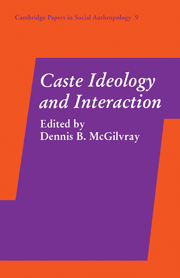Book contents
- Frontmatter
- Contents
- Lists of figures, matrices and tables
- Contributors to this volume
- Note on orthography
- Introduction
- Caste conundrums: Views of caste in a Sinhalese Catholic fishing village
- Mukkuvar vannimai: Tamil caste and matriclan ideology in Batticaloa, Sri Lanka
- Caste rank and verbal interaction in western Tamilnadu
- Caste and politics in India since 1947
- Notes
- Bibliography
- Index
Caste conundrums: Views of caste in a Sinhalese Catholic fishing village
Published online by Cambridge University Press: 04 August 2010
- Frontmatter
- Contents
- Lists of figures, matrices and tables
- Contributors to this volume
- Note on orthography
- Introduction
- Caste conundrums: Views of caste in a Sinhalese Catholic fishing village
- Mukkuvar vannimai: Tamil caste and matriclan ideology in Batticaloa, Sri Lanka
- Caste rank and verbal interaction in western Tamilnadu
- Caste and politics in India since 1947
- Notes
- Bibliography
- Index
Summary
INTRODUCTION
Once, when I was talking about caste with one of the last Italian missionary priests in Sri Lanka, Father Rastoldo, he mentioned to me that caste was only important for the rich and for the low castes. For most Catholics in the country who are neither very rich nor of very low caste, such matters are of relatively minor importance. In my own experience of Catholicism in Sinhalese Sri Lanka, I have found Father Rastoldo's comments to be generally correct. Sometimes people are willing and even eager to talk about caste. Sometimes, no one displays the least interest in an institution which many observers see as being central to South Asian society.
Aims
In this paper I am concerned with one village which I have christened ‘Wellagoda’ and which lies on the coast about 50 miles north of Colombo. The village is entirely Catholic, most of the households depend directly on fishing, and people claim to belong either to the Karava or the Goyigama castes. But for most villagers most of the time, caste is an unimportant matter. In contrast with the impression one often gets when reading descriptions of caste in South Asian villages, caste is not something which affects Wellagoda people on a day-to-day basis. The unimportance of caste in this village seems to me to make the Wellagoda material of some interest in itself, and of some more general interest for the light it may throw on our understanding of caste.
In the present context I cannot hope to explain or account for caste, the peculiarities of caste, or the relative absence of caste in Wellagoda.
- Type
- Chapter
- Information
- Caste Ideology and Interaction , pp. 8 - 33Publisher: Cambridge University PressPrint publication year: 1982
- 19
- Cited by



